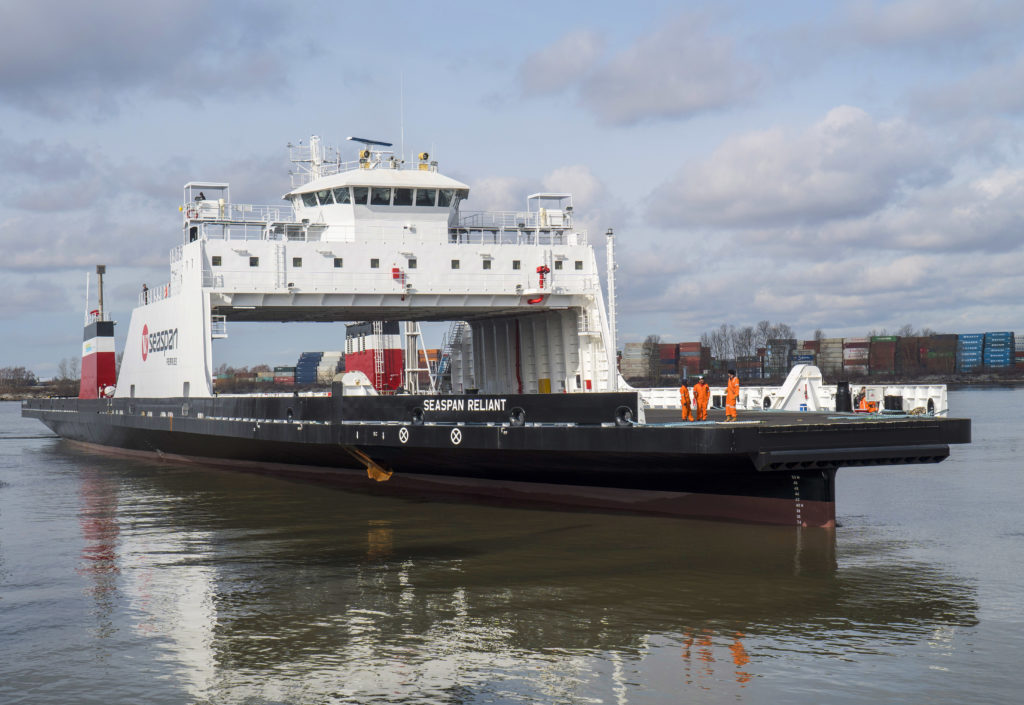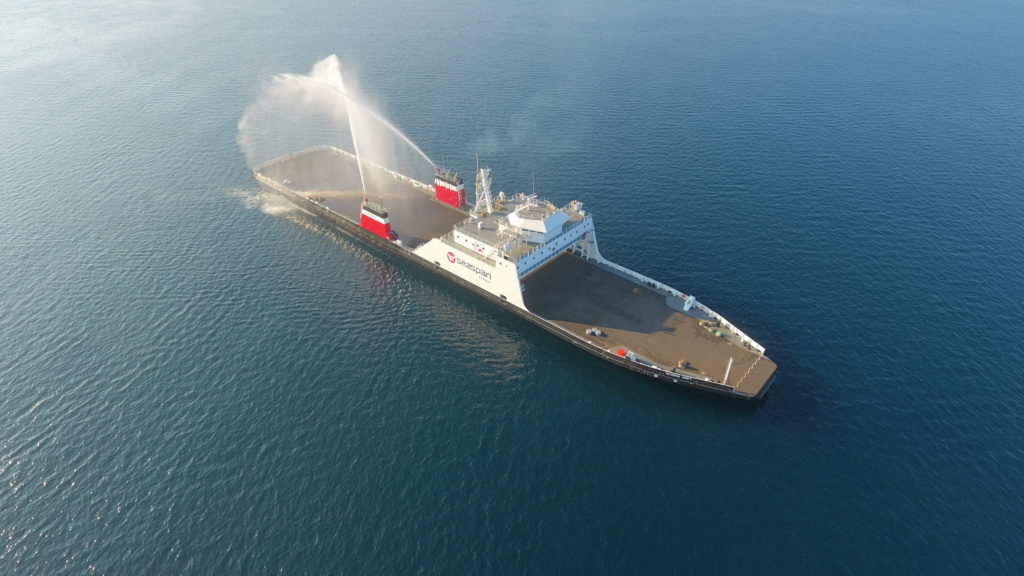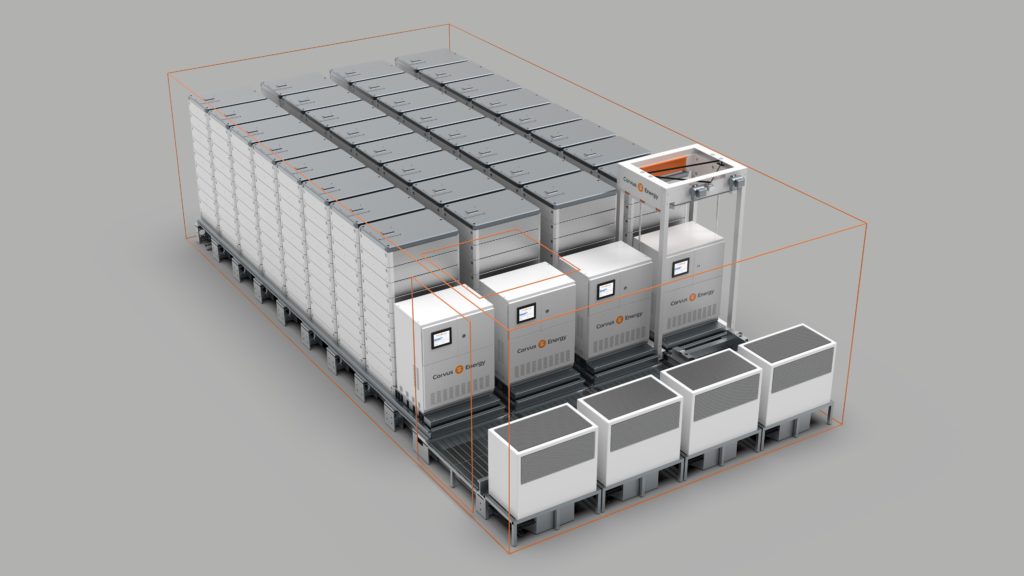Corvus Energy announced on Wednesday (Feb17) that it has reached an agreement with Seaspan Ferries Corporation, of Delta, British Columbia, Canada, for the first delivery of Corvus’ Blue Whale ESS, to be installed onboard one of their cargo ferries.

Blue Whale is a new large-scale energy storage system (ESS)—a groundbreaking battery system designed for large ships with high zero-emission energy demand, such as cruise ships, large Ro-Pax and Ro-Ro ferries, and cargo ships. Its unique rack-free design of stacking modular blocks provides the industry’s highest volumetric battery room energy density and, consequently, maximizes a ship owner’s passenger or payload opportunities.
For its inaugural field trial, the Blue Whale battery system will be installed on board Seaspan Reliant, a roll-on/roll-off drop-trailer cargo ferry built in 2016 that sails the Salish Sea, with service between B.C.’s Lower Mainland and Vancouver Island.
“Seaspan has been an important partner for Corvus Energy. They were amongst the first to install our batteries in North America. Their extensive experience on our battery systems and knowledgeable team makes them the ideal field trial partner,” says Sean Puchalski, EVP Strategy & Business Planning at Corvus Energy. “Corvus Energy is grateful for the generous funding provided to both Corvus and Seaspan by Canada’s Ocean Supercluster, an initiative of Innovation, Science and Economic Development Canada.”

In addition, Corvus greatly appreciates NRC-IRAP, whose multi-year contributions support the research and development of the Blue Whale ESS product and its Battery Monitoring and Optimization System, as well as the Salish Sea Marine Emission Reductions funding provided by Environment & Climate Change Canada to help make the field trial possible.
“The field trial is an important pre-commercial activity that enables the development team to validate requirements for a high-volume robotic production line and a range of complex post-production processes. During this time of restricted travel due to Covid-19, being able to conduct the field trial in the same location as our Canadian development and manufacturing facilities is a huge benefit and allows us to stay on schedule for commercial product release,” says Richard Wing, Chief Research & Development Officer at Corvus Energy.
Corvus’ Wing continues: “Blue Whale is the result of an extensive, multi-million dollar development effort by our Vancouver R&D team. It leverages what the company has learned over the past decade about maritime energy storage requirements. Rethinking the ESS architecture—the battery chemistry and mechanical, electrical, and software building blocks—from the ground up allowed us to be innovative in so many ways. The new architecture is modular and flexible to suit not only Blue Whale, but an ever-expanding range of maritime energy storage applications in the future.”

The Blue Whale ESS will replace an in-service first generation Corvus AT6500 ESS in the existing battery room, increasing the vessel’s energy storage capacity from 545 kWh to 1892 kWh.
“Although Seaspan Reliant is a relatively small vessel for a Blue Whale system and the retrofit will be done on a very tight schedule, the challenging conditions make it ideal for a trial site,” Corvus’ Wing continues. “Moving and situating the Blue Whale modules and pack controllers into the existing battery room will also test and validate the materials handling equipment and service tools we have developed.”
Installation of the new Blue Whale system is scheduled for Summer 2021, at which time Seaspan also plans to relocate the AT6500 system onto sister vessel, Seaspan Swift.
Blue Whale commissioning and trials will be carried out while the vessel is in full-service operation during the the remaining months of 2021. With three and a half times the previous energy capacity, Seaspan will be able to expand the use of battery power beyond spinning reserve to also provide fuel-efficient peak shaving, load balancing, and even zero-emission operation on battery power only.
“The increased battery capacity will give us operational flexibility to enhance service levels while reducing emissions and fuel consumption,” says Harly Penner, Director of Fleet Renewal and Maintenance at Seaspan Ferries. “We are excited to partner with Corvus again. They have been outstanding collaborators in our quest towards decarbonization through fleet hybridization and electrification.”
“Seaspan Ferries is committed to caring for the environment, and this is an exciting opportunity to play a role in the transformation of shipping towards a greener and more sustainable industry,” says Gord Miller, VP Seaspan Ferries. “This trial will also provide valuable experience locally, as personnel from VARD Marine, BC Hydro and the University of British Columbia will provide integration design, shore charging from the grid infrastructure, and emissions reduction studies respectively—all important areas of expertise to develop as British Columbia develops its coastal emissions reduction plans.”
Once installed, performance data from the ESS will be collected automatically, analyzed and monitored remotely through Corvus’ cloud-based monitoring and optimization system, providing valuable feedback to the R&D team.
The Blue Whale field trial and all key maritime authority certifications are expected to be completed by Spring 2022, at which time commercial deliveries will commence.